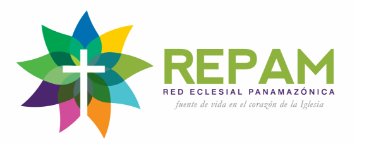The activities of the indigenous leaders from the Amazon, participants in the first experience of the new school launched by REPAM for the formation and defense of indigenous rights, in Washington DC from 15th to 31st March was an important step in the in the consolidation of the REPAM platform towards promoting a Church with an Amazonic Face as expressed by 180 participants in the meeting in Puyo , Ecuador, November, 2016. The vision expressed is a demand for a church inclusive of our cultures, cosmo-vision and languages. A church that understands, respects and appreciates our spirituality, inculturated, close to the people, prepared to stay with us, sharing our colours, hopes, and dreams, in our struggles to defend our land, rivers and rainforest.
The visit to Washington was to be the realization of the final 2 week module of the school inaugurated in April 2016 in Coca, Ecuador. The participants were 13 indigenous leader, accompanied by pastoral agents, representatives of the major conflictive flashpoints throughout the Panamazon region of Brazil, Peru, Colombia and Ecuador, where indigenous peoples are defenseless in the face of violent expulsion from their ancestral lands in the face of the incursion of the extractive industries, their unending quest for oil, minerals, timber, agribusiness and mono crops, the construction of mega hydro electric dams. The leaders participants engaged in a 5 week intensive learning intern regime with the help of a team of experts, they all contributed their time ad honoren, learning about their territorial rights comprised of the ecological universe of land, rivers, forest, their sense of protection of the ecosystem that ensures sustainability and ecological balance. They had time to learn and reflect on their territory, its local, regional, national and Pan amazonic levels of protection sanctioned by UN legislation, whose jurisprudence and application is in practice ignored and over run by the complicity of the nation states in collusion with the interests of the extractive industries conglomerates. Equally valuable was the time shared in bonding, developing friendships born of similar struggles, a growing awareness of nascent shared leadership with larger horizons that go beyond their inmediate group, a sense of greater Pan Amazon reality. The leaders committed to replicating the 5 week experience in their own territories with a view towards building wider community based leadership and shared responsibility.
The Washngton group comprised the Awajun/Wampis case, Depts Loreto and Amazonas, Perú represented by Zebelio Kayap Jempekit and Ricardo Cornejo CAAP; the Jeberillos Yurimaguas case, Depts Loreto and San Martín, Perú, led by Lily Calderón. The Jaminawa case, Acre, Brasil represented by Rosildo da Silva, supported by Lindomar Dias Padilha, CIMI Occidental; the Burucutipu case, Marañao represented by Hna Yakelyn Vasquez; The Shuar case, Ecuador led by Luis Sanchez Zhiminayella and María de los Angeles Marco Teja JPIC, CER and the Chaparrito, Meta case in Colombia represented by Marco Antonio Martinez and Dayana Contreras Sierra. Supported by Cardinal Cladio Hummes and Mon Pedro Barreto and members of the Executive Consejo of REPAM. Thanks to the invaluable support of the Washington based team of representatives of male and female congregations who undertook the herculean task of logistics, travel arrangements, accommodation etc. we were able to fulfill an ambitious prepared agenda in three areas, political, academic and faith celebration. The objective was to gain first hand experience in situ of relating to the political organizations that have direct responsibility for the people of the Amazon, O.E.A., CIDH, US Congress and United Nations. Media coverage also gave exposure and some profile of REPAM to a wider public.
The main activity was the public audience in the American Commission for Human Rights scheduled on 17th March. A little history was made when indigenous leaders from the Pan Amazon region presented forceful and detailed accounts of the abuse, suffering and lack of protection to which their people are continually subjected to and victimized. Their plea to the Commission was heard accurately by the presiding president Dr. Francisco Eguiguren, who stressed the issues of the right of consultation for government concessions to extractive conglomerates which the Commission had previously defended in the Court of Human Rights, Costa Rica. The audience ended with a joint agreement to work together to ensure respect for lives and the rights of peoples and the environment. Further to the audience the Commission staff devoted two full training days for the leaders who expressed their gratitude for the opportunity of valuable input in different areas with a view to future denunciations and work with the Commission. Further training followed with groups assigned to both the World Bank and particularly Chinese investment in the Amazon.
Academic activity took place in the Catholic University of Washington, an open forum for staff, students and public on the reality of the Pan Amazon region and the role of REPAM. A full day was spent at Georgetown University where the REPAM group was hosted in the Berkley Center which has special interest in Amazon studies. Working agreements were made for ongoing support and cooperation from the Center in support of REPAM. The President and staff hosted a working meeting which was appreciated and again provided guidelines for an ongoing working relationship.
Visits to members of U.S. Congress were fruitful in the agreement of Congress members to form support groups for the indigenous leaders especially in on the abuse of free trade agreements.
The group was received by The U.S. Conference of Catholic Bishops who expressed support for the work. Various Eucharistic celebrations were held in universities, parishes and an ecumenical center as well as a peace celebration at the Franciscan monastery of the Holy Sepulcher. The inspiring words of Cardinal Hummes was a feature of these religious events.
By: Peter Hughes
